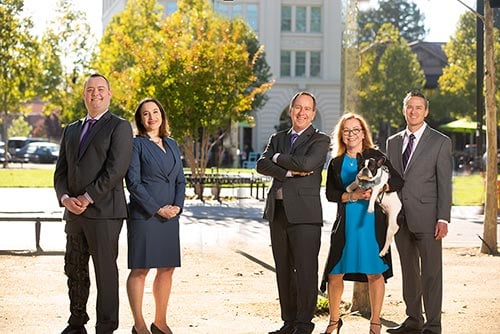As with much of what will be addressed quarterly in this space by the Diversity + Inclusion section of the Sonoma County Bar Association, the concept of gender (our deeply held, internal sense of self as a woman, man, a blend of both, or neither; who we internally know ourselves to be; often heavily influenced by socialization, and is fundamentally different than one’s assigned sex at birth1) as binary — that is, that there are only two sexes, female or male; that there are only two genders, man or woman; that there are only two sexualities, gay or straight — arrived uninvited on the North American Continent with the Puritans in the early 17th Century.2 The “City on the Hill” had clearly defined roles for all members of the Elect and the experience of what scholars call “Two Spirit,” (those with both a male and female spirit inside them) was not part of the Puritan society or culture.
As it turns out, many, many cultures around the world recognize that gender is not, in fact, experienced as binary.3 This is as true today as it was 500 years ago, but what we have now that those Europeans didn’t is scientific evidence that demonstrates irrevocably, irrefutably, and inexorably that human beings at our core are far too sophisticated to be binary, about anything.4
As our society has begun to understand and validate the lived experiences of transgender and non-binary individuals, we have become more aware of gender pronouns and how they limit expression.
Being reminded of the challenges we don’t have to navigate when our physical appearance, presentation, or abilities align with those of the privileged caste in our culture can be uncomfortable (although not nearly as uncomfortable as having to navigate those challenges) and no one wants to feel scolded for unconsciously upholding a system that benefits some at a cost to others; nonetheless, the responsibility is on those who are benefiting from this system to examine, address and ultimately act to make those benefits available to everyone. One way to hasten and ease the process is to make discomfort your ally, to sit with it just long enough to provoke action. Those in the privileged caste cannot wait for the “perfect” response; we must take action as imperfect allies.
“The single biggest problem in communication is the illusion that it has taken place.” G.B. Shaw
Recognizing that much of the bias experienced or benefits accrued in life are based on the implicit and unconscious biases underlying our social structure, we cannot separate the role of language in upholding the bias ingrained in our appearance-based caste system.
Language is complicated and contains many parts; syntax, vocabulary, and grammar all combine in an agreed-upon series of utterances that allow us to express the complex, intimate, far-reaching, and deeply personal ideas, experiences, and circumstances of each of our daily lives. Found in many languages around the world, pronouns are nouns that take the place of proper nouns, e.g., “Have you seen the large, antique, round, green, flour sifter?” “No, haven’t seen it.” Pronouns are a communication shortcut, and of the 23 pronouns used in modern English, it is third person, personal pronouns that end up limiting communication instead of supporting it. This is because so many of us have an implicit understanding of what it is to be “she,” “her,” “he,” or “him,” (and a lot of us are just plain stubborn about using the third person “they” for a singular being; it is past time to get over that) that we use our own understanding of that pronoun to define and describe the person in front of us, to decide who they are, before they tell us who they are. These shortcuts often reflect and reinforce the implicit biases of the privileged caste. This is prejudice.
“It is easier to build strong children than to repair broken men (sic).” Frederick Douglass
History has clearly writ the dominant influence the Puritans would play in developing, installing and maintaining a caste system based on appearance, a slippery slope down which the third person, personal pronouns have been sliding over the last few decades.
In the case of pronouns, a person whose external appearance complies with the Puritan’s vision of gender roles, and is an accurate reflection of who they know themselves to be, is in the privileged caste, and might look forward to an afternoon with their family because they won’t be asked intrusive questions, or be misgendered; they won’t be avoiding their family because their family doesn’t or won’t use language to recognize and accept them; that person will have the support of their community in their daily lives. These are microaggressions with macro consequences. Not being seen and accepted leads to harm from without and within as pan gender and non-binary teens are five times more likely to attempt suicide than those identifying as binary or one gender5 and, on top of the other horrors of 2020, last year included a startling increase in the murder of transgender and non-conforming people.6
“Do the best you can until you know better. Then when you know better, do better.” Maya Angelou
As attorneys, judges, legal secretaries, and paralegals, we believe in the power of the rule of law and are committed to equitable access to that essential, foundational element of the American legal system. To do that, our legal community must take steps to reflect and respect all the members of our community at large. The question of pronouns is really a question of respect, empathy, and compassion. Asking someone “What are your preferred pronouns?” or including pronouns when introducing yourself, demonstrates you possess those qualities.
It can feel daunting to ask someone their pronouns, what if you offend someone just by asking? When meeting someone for the first time, offer your own as part of your introduction. By offering pronouns first, others notice your awareness of the fact that not everyone fits into stereotypical binary gender and that you are interested in other people’s lived experiences. This may be the first opportunity they have had to consider how pronouns affect them and others and to talk about why pronouns are important. Sharing pronouns and teaching others about the importance of doing so disrupts the privilege of that assumption and broadens normalization.
It is important to remember not to single out one person in a group and ask them to share pronouns. This may cause others to think that person is transgender or nonbinary and can put them at risk. Being simply perceived as transgender or nonbinary, whether the person truly is or not, can make a person feel unsafe and may even be dangerous for that person. Instead, in a group setting, it is best to share your name and pronouns to allow others to do so as part of their own introductions. You can also include your pronouns on business cards near or below your name, on your professional website, and on your social media accounts and many people include links below the pronouns to websites that explain why naming the pronouns is important.
Also, introducing yourself with your pronouns, using gender-neutral honorifics such as Mx. instead of Mr., Mrs., Ms. or Miss, or asking someone their preferred pronouns are 100% guaranteed to keep you from embarrassing yourself by misgendering someone! Misgendering a person means referring to someone in a way that does not correlate with their gender identity. If you find you have done that, it is no greater or less a social faux pas than any other; simply apologize! Being willing to admit that one’s unconscious racial/educational/language/cisgender/heterosexual/religious bias made an appearance is a great practice for allies to acknowledge privilege and demonstrate allyship. Forewarned is forearmed: you are undoing a lifetime of unconscious bias so you may apologize more than once. It’s not about feeling shame or guilt, it’s about the members of our family, our professional colleagues, our clients and our co-workers feeling safe and known. And anyone can do the right thing, if someone else misgenders a person, do not ignore it. You can correct them politely and swiftly, without making it a big deal (e.g., actually Max uses she pronouns).
Allyship is crucial. Representation matters. Because pronouns are shortcuts and those shortcuts have been reinforced on this continent for the past 500 years, those of us who have the good fortune to present as we are must stand for diversity and inclusion. On a larger note, who is anyone to judge how another human being wants to be addressed? Why wouldn’t you want to express compassion and empathy for someone who, through no fault of their own, has had to face greater challenges than you? Shortcuts are for the lazy and language is no exception. Use a little creativity and individuality instead of relying on the worn and tired “sir” and “ma’am.” The legal community can demonstrate our allyship and our commitment to a more inclusive, more just society by demonstrating that compassion and empathy for all members of our community.
Jor Grapentine, M.A., (they/them) is the Gender & Sexuality Program Coordinator at Sonoma State University.
Rebecca Slay (she/hers) is a member of the Diversity + Inclusion section of the Sonoma County Bar Association and worked in public policy before joining Meechan, Rosenthal & Karpilow, P.C. as a civil litigation paralegal.
______________________
1 hub.sonoma.edu/gender-sexuality/glossary
2 https://www.khanacademy.org/humanities/us-history/colonial-america/colonial-north-america/a/puritan-new-england-massachusetts-bay
3 https://www.pbs.org/independentlens/content/two-spirits_map-html/
4 https://blogs.scientificamerican.com/voices/stop-using-phony-science-to-justify-transphobia/
5 https://www.thetrevorproject.org/resources/preventing-suicide/facts-about-suicide/
6 https://transequality.org/blog/murders-of-transgender-people-in-2020-surpasses-total-for-last-year-in-just-seven-months

